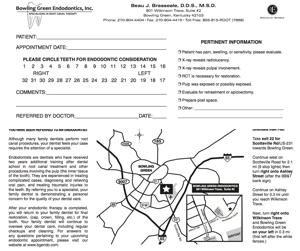A typical visit to an endodontist begins with completing paperwork, which includes your medical history and consent forms (Click Here if you want to download and print those froms ahead of time). It is advisable to bring a list of all the medications (over-the-counter and prescription) that you regularly/have taken within the past month. Once [...]
Our expert staff coordinates your care with your general dentist to ensure that your visit at our office is easy and seamless. Below you’ll find answers to some commonly asked questions, but feel free to contact our office if you have any questions or special needs.
Click Here for a More Detailed Explanation. “Endo” is the Greek word for “inside” and “odont” is Greek for “tooth.” Endodontic treatment treats the inside of the tooth. To understand endodontic treatment, it helps to know something about the anatomy of the tooth. Inside the tooth, under the white enamel and a hard layer called [...]
What should I expect following endodontic treatment? The root canal system inside your tooth has been thoroughly cleaned, and the irritated tissue and bacteria that have caused you to need root canal treatment are gone. It is normal to feel some tenderness in the area over the next few days as your body undergoes the [...]
Many endodontic procedures are performed to relieve the pain of toothaches caused by pulp inflammation or infection. With modern techniques, you will be profoundly numb and comfortable during your treatment. For the first few days after treatment, your tooth may feel sore, especially if there was pain or infection before the procedure. This discomfort can [...]
Endodontic treatment, also called Root Canal Therapy, can often be performed in one or two visits and involves the following steps: 1. The endodontist examines and x-rays the tooth, then administers local anesthetic. After the tooth is numb, the endodontist places a small protective sheet called a “dental dam” over the area to isolate the [...]
Endodontic Retreatment My tooth has already had a root canal, but my dentist referred me to have it retreated. Why is that? As occasionally happens with any dental or medical procedure, a tooth may not heal as expected after initial treatment for a variety of reasons: • Narrow or curved canals were not treated during [...]
Endodontic Surgery Why would I need endodontic surgery? • Surgery can help save your tooth in a variety of situations • Surgery may be used in diagnosis. If you have persistent symptoms but no problems appear on your x-ray, your tooth may have a tiny fracture or canal that could not be detected during nonsurgical [...]
Cracked Teeth With their more sophisticated procedures, dentists are helping people keep their teeth longer. Because people are living longer and more stressful lives, they are exposing their teeth to many more years of crack-inducing habits, such as clenching, grinding, and chewing on hard objects. These habits make our teeth more susceptible to cracks. How [...]
Endodontists are dentists with at least two additional years of advanced specialty education in diagnosis and root canal treatment. Because they limit their practices to endodontics, they treat these types of problems every day. They use their special training and experience in treating difficult cases, such as teeth with narrow or blocked canals, or unusual [...]
